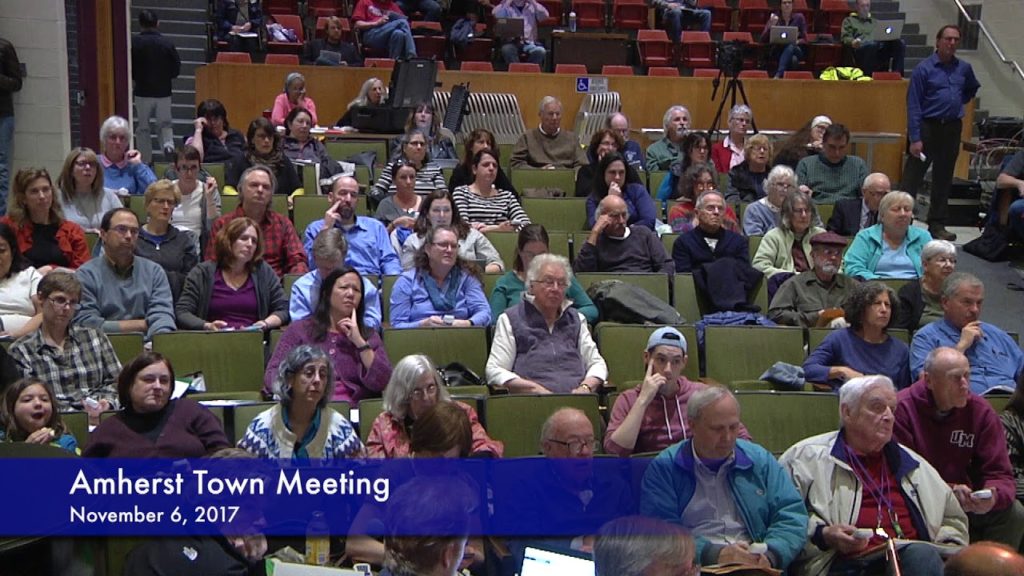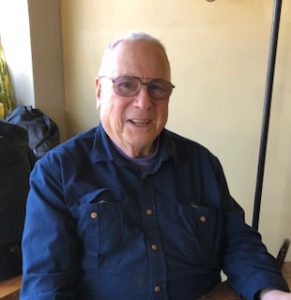A COMMUNITY ADVISORY COUNCIL: BACKGROUND TO A PROPOSAL

Amherst Town Meeting. Photo: Amherst Media
by Michael Greenebaum

Once upon a time, Amherst had a Town Meeting. And if this sounds like the opening of a fairy tale, perhaps that is an interesting way to think about town government. Like most fairy tales, Town Meeting had good guys and bad guys, although unlike fairy tales, folks couldn’t agree about who was which. That was one of its strengths – like legislatures at the state and national levels, Town Meeting members contended with one another and often with town boards and committees. It was not always easy or pleasant, and often the contention seemed to break the bounds of bylaws and rules. Old friends stopped talking to each other, and conspiracy theories abounded. By the end, town boards and town meeting members sat glowering at each other and town government felt broken by all participants. The Kingdom was sad.
In the last year of its existence, Town Meeting considered and adopted a proposal for a Town Meeting Advisory Committee (TMAC) which, had Town Meeting survived, could have gone a long way towards addressing the problem by creating a non-adversarial, deeper, and more critical assessment of major proposals presented to town government. TMAC would accomplish this in two ways. First, it would assess proposals in terms of their benefits and impacts upon a number of areas of town life beyond those customarily considered by town boards and committees. The following list suggests what some of those areas might be:
- Specific Neighborhoods.
Changes to the Zoning Bylaws, decisions about traffic, development and conservation may have both benefits and impacts on Amherst neighborhoods.
- Individual Taxpayers.
Amherst residents have a wide spectrum of income and ability to accommodate rising property tax rates and other demands.
- Specific Populations.
Children, the elderly, and the infirm, among others, are differently affected by government decisions.
- The Amherst Streetscape.
The appearance of the town, as well as its relationship to the varied eras in its history, have an essential contribution to its economy as well as its culture and the lives of its citizens.
- Public Safety.
Beyond the provision of an adequately trained and provisioned staff of police officers and firefighters, budget and zoning decisions can have indirect impacts on the safety of town residents.
- Town Economy.
Town decisions concerning parking, public spaces, and tourism can have many consequences with ripple effects on the town economy that are not immediately evident.
- The Environment.
In addition to the preservation and protection of open spaces, town decisions can have indirect and long-term impacts on air quality, recreation, and accessibility.
- Democratic Governance.
Modifications of the Town Charter or other decisions about governance can have unintended consequences for the active participation of town residents in town affairs.
When the voters decided to replace the Select Board/Town Meeting form of government with a Town Council, none of the above areas of concern changed. And indeed this is only a partial list of the categories under which benefits and impacts to the town might be assessed.
The second part of the TMAC proposal was the creation of the Advisory Council itself, whose membership would be widely representative of the town’s population by age, ethnicity, and economics. Voices from this wide range of backgrounds would provide a wide lens with which to examine benefits and impacts. TMAC’s analyses would be supplemental to the work done by the Finance Committee, Planning Board, Select Board, and Town Hall.
On April 1 this year, Meg Gage, on behalf of the members of TMAC, whose positions, of course, expired with Town Meeting, proposed a similar committee to the Town Council. A Citizens’ Advisory Committee (CAC), with a charge similar to that of TMAC, would become enfolded into the governmental structure. It would report to the Town Council and address matters referred to it by the Town Council.
I think it would be fair to say that the Town Council considered this proposal carefully but not warmly. Some members seemed interested in incorporating some form of a benefits and impacts statement into their deliberations, and perhaps even a checklist to assure that they had considered them in reaching a decision. They seemed less interested in a new committee and were eager to refer that matter to one of their newly established standing committees, either government operations or community relations. In the end, they referred it to the governmental operations committee, which did not welcome this referral.
I can understand Town Council’s position. It has been in existence about four months and is coming to terms with the challenges of having what is essentially a unicameral form of government combining executive and legislative functions. It is a lot of work, some of which probably was not evident when councilors ran for their positions. And, I think, there is a residue of some of the contention and even suspicion from the last days of Town Meeting. Since the members of TMAC were generally not supportive of the charter change, the proposal carried a tinge of possible adversarial positioning. This was unfair to the proposal, and since it was unstated, could not be addressed at the meeting. I might be surprised, and the proposal might get a favorable referral back to Town Council, but as I write, in the last days of April, I doubt that this will be the case.
So I have another idea: an Advisory Council outside the structure of town government. In my next commentary I will explain what this might look like and why an independent advisory body is so essential to the proper functioning of town government. And why, although never welcomed, adversarial positions are always needed to provide both the substance and the appearance of representative democracy.

2 thoughts on “A COMMUNITY ADVISORY COUNCIL: BACKGROUND TO A PROPOSAL”